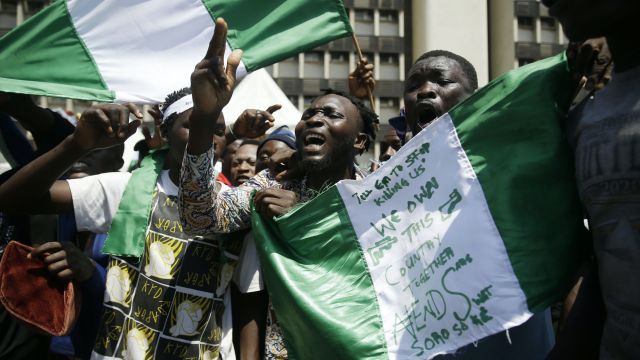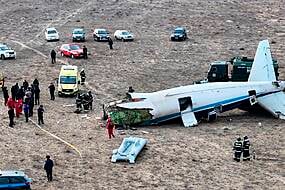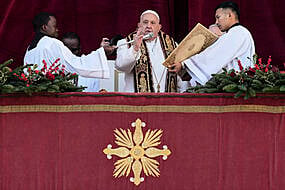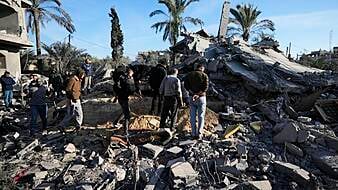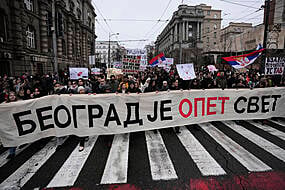Shots were fired as youngsters set up barricades by the Lekki toll plaza in Lagos, where protesters were fired upon on Tuesday night, causing injuries and an unknown number of deaths.
There were reports of gunfire across Lagos, Nigeria’s largest city of 14 million, including on the highway to the airport, at a major bus station and outside the offices of a television station.
Smoke could be seen billowing from several points in central Lagos.
Demonstrations and gunfire were also reported in several other Nigerian cities, including the capital city, Abuja.
Nigerians are reeling from video on Tuesday night at the Lekki toll plaza in which protesters could be heard singing the national anthem in the darkness.
Shots can be heard followed by sounds of people running away.
It is not clear who was firing the shots heard in the video but Nigeria’s security forces have been blamed for at least 10 deaths during the protests by Amnesty International, which has accused the police and military of using excessive force against the demonstrators.
There have also been widespread reports of youthful protesters being attacked by armed gangs, who the demonstrators say were sent by the police to break up the protests.
Lagos governor’s confirmed more than 20 injuries from the Lekki shootings but said no-one had been killed.
He said he went to hospitals and mortuaries throughout the city.
Speaking in a televised address, Obajide Sanwo-Olu said he has ordered an investigation into the actions of the military at Lekki plaza, an indication that the army may be responsible.
“For clarity, it is imperative to explain that no sitting governor controls the rules of engagement of the military,” he said.
“I have nonetheless instructed an investigation into the orders and the adopted rules of engagement employed by the officers and men of the Nigerian army that were deployed to the Lekki tollgate last night.
Amnesty International has received credible but disturbing evidence of excessive use of force occasioning deaths of protesters at Lekki toll gate in Lagos. #EndSARS #Lekki #Nigeria
Advertisement— Amnesty International Nigeria (@AmnestyNigeria) October 20, 2020
“This is with a view to taking this up with a higher command of the military and to seek the intervention of Mr President in his capacity as a commander in chief to unravel the sequence of events that happened yesterday night.”
He tweeted on Wednesday: “This is the toughest night of our lives as forces beyond our direct control have moved to make dark notes in our history, but we will face it and come out stronger.
“I’ve just concluded visits to hospitals with victims of this unfortunate shooting incident at Lekki.”
He had earlier warned on Twitter that the protests against police brutality had “degenerated into a monster that is threatening the well-being of our society”.
President Muhammadu Buhari has remained silent on the protests and violence sweeping across the country.
Before the shootings at Lekki, Nigeria’s police statement warned security forces would now “exercise the full powers of the law to prevent any further attempt on lives and property of citizens”.
The curfew in Lagos began on Tuesday afternoon and most businesses and shops are closed across the city.
Demonstrators are erecting barricades in the streets.
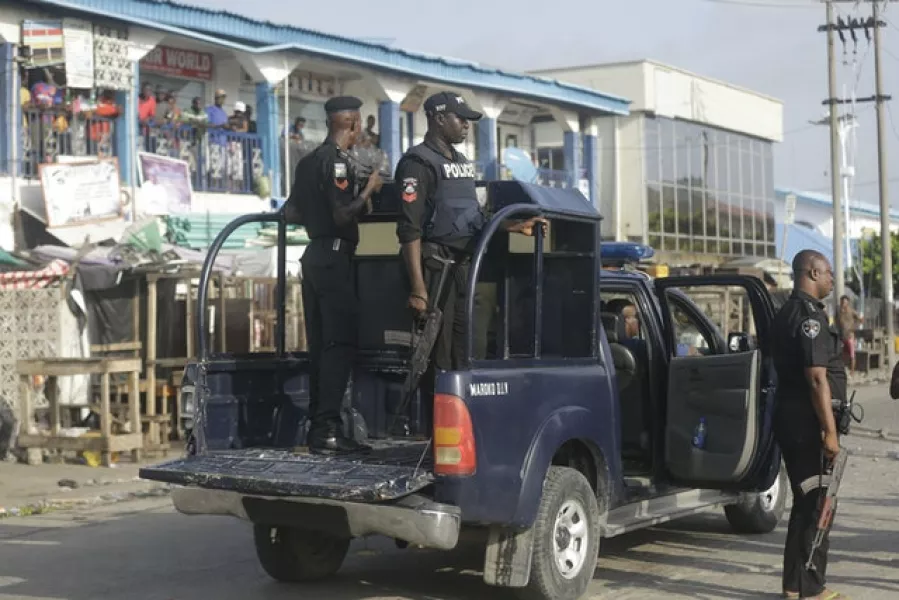
The curfew was announced after a police station was burned down in the city and two people were shot dead by police.
Lagos has been at the centre of the protests, with demonstrators at times blocking access to the airport and barricading roads leading to the country’s main ports.
A curfew also went into effect in Benin City after a pair of attacks on correctional facilities that left 1,993 inmates missing.
Interior Ministry spokesman Mohammed Manga said large, armed crowds had attacked the two prisons, subduing the guards on duty.
It is unclear what the prisons’ exact populations had been before the attack.
The protests began two weeks ago after a video circulated showing a man being beaten, apparently by police officers of the Special Anti-Robbery Squad, known as SARS.
